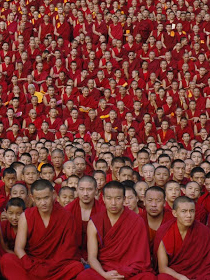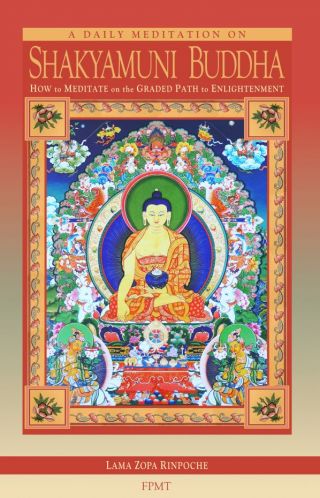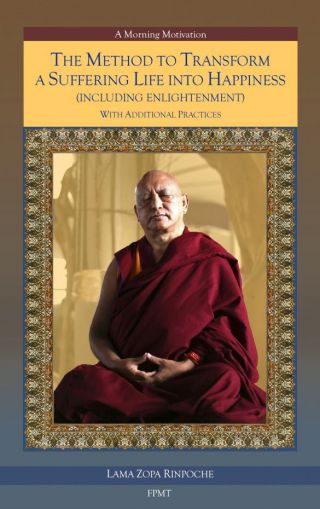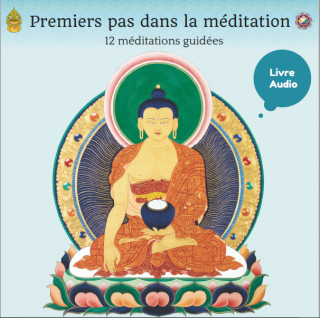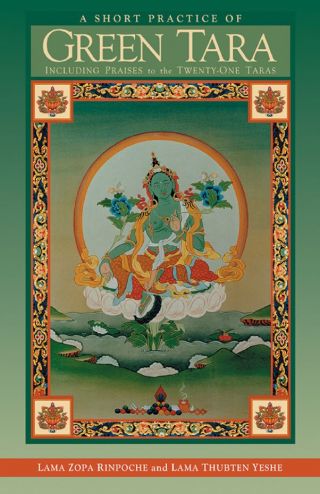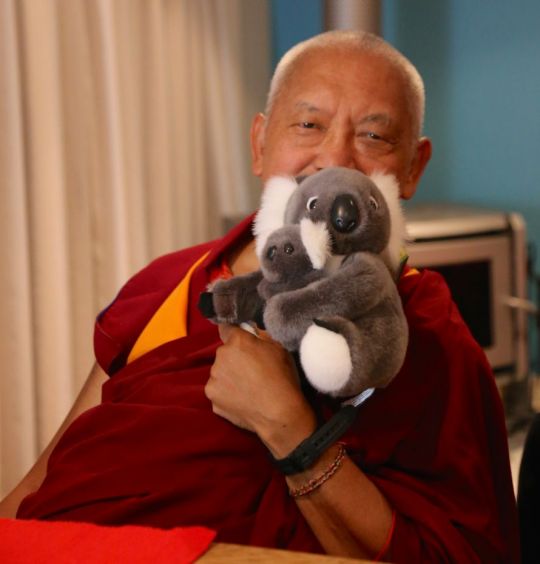- Home
- FPMT Homepage
Foundation for the Preservation of the Mahayana Tradition
The FPMT is an organization devoted to preserving and spreading Mahayana Buddhism worldwide by creating opportunities to listen, reflect, meditate, practice and actualize the unmistaken teachings of the Buddha and based on that experience spreading the Dharma to sentient beings. We provide integrated education through which people’s minds and hearts can be transformed into their highest potential for the benefit of others, inspired by an attitude of universal responsibility and service. We are committed to creating harmonious environments and helping all beings develop their full potential of infinite wisdom and compassion. Our organization is based on the Buddhist tradition of Lama Tsongkhapa of Tibet as taught to us by our founders Lama Thubten Yeshe and Lama Thubten Zopa Rinpoche.
- Willkommen
Die Stiftung zur Erhaltung der Mahayana Tradition (FPMT) ist eine Organisation, die sich weltweit für die Erhaltung und Verbreitung des Mahayana-Buddhismus einsetzt, indem sie Möglichkeiten schafft, den makellosen Lehren des Buddha zuzuhören, über sie zur reflektieren und zu meditieren und auf der Grundlage dieser Erfahrung das Dharma unter den Lebewesen zu verbreiten.
Wir bieten integrierte Schulungswege an, durch denen der Geist und das Herz der Menschen in ihr höchstes Potential verwandelt werden zum Wohl der anderen – inspiriert durch eine Haltung der universellen Verantwortung und dem Wunsch zu dienen. Wir haben uns verpflichtet, harmonische Umgebungen zu schaffen und allen Wesen zu helfen, ihr volles Potenzial unendlicher Weisheit und grenzenlosen Mitgefühls zu verwirklichen.
Unsere Organisation basiert auf der buddhistischen Tradition von Lama Tsongkhapa von Tibet, so wie sie uns von unseren Gründern Lama Thubten Yeshe und Lama Thubten Zopa Rinpoche gelehrt wird.
- Bienvenidos
La Fundación para la preservación de la tradición Mahayana (FPMT) es una organización que se dedica a preservar y difundir el budismo Mahayana en todo el mundo, creando oportunidades para escuchar, reflexionar, meditar, practicar y actualizar las enseñanzas inconfundibles de Buda y en base a esa experiencia difundir el Dharma a los seres.
Proporcionamos una educación integrada a través de la cual las mentes y los corazones de las personas se pueden transformar en su mayor potencial para el beneficio de los demás, inspirados por una actitud de responsabilidad y servicio universales. Estamos comprometidos a crear ambientes armoniosos y ayudar a todos los seres a desarrollar todo su potencial de infinita sabiduría y compasión.
Nuestra organización se basa en la tradición budista de Lama Tsongkhapa del Tíbet como nos lo enseñaron nuestros fundadores Lama Thubten Yeshe y Lama Zopa Rinpoche.
A continuación puede ver una lista de los centros y sus páginas web en su lengua preferida.
- Bienvenue
L’organisation de la FPMT a pour vocation la préservation et la diffusion du bouddhisme du mahayana dans le monde entier. Elle offre l’opportunité d’écouter, de réfléchir, de méditer, de pratiquer et de réaliser les enseignements excellents du Bouddha, pour ensuite transmettre le Dharma à tous les êtres. Nous proposons une formation intégrée grâce à laquelle le cœur et l’esprit de chacun peuvent accomplir leur potentiel le plus élevé pour le bien d’autrui, inspirés par le sens du service et une responsabilité universelle. Nous nous engageons à créer un environnement harmonieux et à aider tous les êtres à épanouir leur potentiel illimité de compassion et de sagesse. Notre organisation s’appuie sur la tradition guéloukpa de Lama Tsongkhapa du Tibet, telle qu’elle a été enseignée par nos fondateurs Lama Thoubtèn Yéshé et Lama Zopa Rinpoché.
Visitez le site de notre Editions Mahayana pour les traductions, conseils et nouvelles du Bureau international en français.
Voici une liste de centres et de leurs sites dans votre langue préférée
- Benvenuto
L’FPMT è un organizzazione il cui scopo è preservare e diffondere il Buddhismo Mahayana nel mondo, creando occasioni di ascolto, riflessione, meditazione e pratica dei perfetti insegnamenti del Buddha, al fine di attualizzare e diffondere il Dharma fra tutti gli esseri senzienti.
Offriamo un’educazione integrata, che può trasformare la mente e i cuori delle persone nel loro massimo potenziale, per il beneficio di tutti gli esseri, ispirati da un’attitudine di responsabilità universale e di servizio.
Il nostro obiettivo è quello di creare contesti armoniosi e aiutare tutti gli esseri a sviluppare in modo completo le proprie potenzialità di infinita saggezza e compassione.
La nostra organizzazione si basa sulla tradizione buddhista di Lama Tsongkhapa del Tibet, così come ci è stata insegnata dai nostri fondatori Lama Thubten Yeshe e Lama Zopa Rinpoche.
Di seguito potete trovare un elenco dei centri e dei loro siti nella lingua da voi prescelta.
- 欢迎 / 歡迎
简体中文
“护持大乘法脉基金会”( 英文简称:FPMT。全名:Foundation for the Preservation of the Mahayana Tradition) 是一个致力于护持和弘扬大乘佛法的国际佛教组织。我们提供听闻,思维,禅修,修行和实证佛陀无误教法的机会,以便让一切众生都能够享受佛法的指引和滋润。
我们全力创造和谐融洽的环境, 为人们提供解行并重的完整佛法教育,以便启发内在的环宇悲心及责任心,并开发内心所蕴藏的巨大潜能 — 无限的智慧与悲心 — 以便利益和服务一切有情。
FPMT的创办人是图腾耶喜喇嘛和喇嘛梭巴仁波切。我们所修习的是由两位上师所教导的,西藏喀巴大师的佛法传承。
繁體中文
護持大乘法脈基金會”( 英文簡稱:FPMT。全名:Found
ation for the Preservation of the Mahayana Tradition ) 是一個致力於護持和弘揚大乘佛法的國際佛教組織。我們提供聽聞, 思維,禪修,修行和實證佛陀無誤教法的機會,以便讓一切眾生都能 夠享受佛法的指引和滋潤。 我們全力創造和諧融洽的環境,
為人們提供解行並重的完整佛法教育,以便啟發內在的環宇悲心及責 任心,並開發內心所蘊藏的巨大潛能 — 無限的智慧與悲心 – – 以便利益和服務一切有情。 FPMT的創辦人是圖騰耶喜喇嘛和喇嘛梭巴仁波切。
我們所修習的是由兩位上師所教導的,西藏喀巴大師的佛法傳承。 察看道场信息:
- FPMT Homepage
- News/Media
-
- Study & Practice
-
-
- About FPMT Education Services
- Latest News
- Programs
- New to Buddhism?
- Buddhist Mind Science: Activating Your Potential
- Heart Advice for Death and Dying
- Discovering Buddhism
- Living in the Path
- Exploring Buddhism
- FPMT Basic Program
- FPMT Masters Program
- FPMT In-Depth Meditation Training
- Maitripa College
- Lotsawa Rinchen Zangpo Translator Program
- Universal Education for Compassion & Wisdom
- Online Learning Center
-
- Prayers & Practice Materials
- Overview of Prayers & Practices
- Full Catalogue of Prayers & Practice Materials
- Explore Popular Topics
- Benefiting Animals
- Chenrezig Resources
- Death & Dying Resources
- Lama Chopa (Guru Puja)
- Lama Zopa Rinpoche: Compendium of Precious Instructions
- Lama Zopa Rinpoche: Life Practice Advice
- Lama Zopa Rinpoche Practice Series
- Lamrim Resources
- Mantras
- Prayer Book Updates
- Purification Practices
- Sutras
- Thought Transformation (Lojong)
- Audio Materials
- Dharma Dates - Tibetan Calendar
- Translation Services
- Publishing Services
- Ways to Offer Support
- Prayers & Practice Materials
-
- Teachings and Advice
- Find Teachings and Advice
- Lama Zopa Rinpoche Advice Page
- Lama Zopa Rinpoche: Compendium of Precious Instructions
- Lama Zopa Rinpoche Video Teachings
- ༧སྐྱབས་རྗེ་བཟོད་པ་རིན་པོ་ཆེ་མཆོག་ནས་སྩལ་བའི་བཀའ་སློབ་བརྙན་འཕྲིན།
- Podcasts
- Lama Yeshe Wisdom Archive
- Buddhism FAQ
- Dharma for Young People
- Resources on Holy Objects
- Teachings and Advice
-
-
*If a menu item has a submenu clicking once will expand the menu clicking twice will open the page.
-
-
- Centers
-
- Teachers
-
- Projects
-
-
-
-
*If a menu item has a submenu clicking once will expand the menu clicking twice will open the page.
-
-
- FPMT
-
-
-
-
-
Over and over again our experiences prove that it is our mental outlook that is fundamentally responsible for whether we are successful or unsuccessful, healthy or ill, attractive or ugly, happy or depressed.
Lama Thubten Yeshe
-
-
-
- Shop
-
-
-
The Foundation Store is FPMT’s online shop and features a vast selection of Buddhist study and practice materials written or recommended by our lineage gurus. These items include homestudy programs, prayers and practices in PDF or eBook format, materials for children, and other resources to support practitioners.
Items displayed in the shop are made available for Dharma practice and educational purposes, and never for the purpose of profiting from their sale. Please read FPMT Foundation Store Policy Regarding Dharma Items for more information.
-
-
Study & Practice News
10
Available in Print! A Daily Meditation on Shakyamuni Buddha
Lama Zopa Rinpoche reorganized many of the prayers based on his current way of doing them and, in particular, added an extensive explanation of the visualizations to be done while taking refuge. Drawn from Phabongkha Rinpoche’s Liberation in the Palm of Your Hand, for each of the objects of refuge—Guru, Buddha, Dharma, and Sangha—there are visualizations for purifying negative karma, increasing qualities, and coming under the guidance of that object of refuge.
Subtitled “How to Meditate on the Graduated Path to Enlightenment,” the practices contained in this booklet prepare the mind for lamrim meditation by purifying negative karma and collecting extensive merit—the two main causes for attaining realizations.
This practice can also be used as a basis for engaging in the preliminary practices of accumulating 100,000 prostrations, mandala offerings, and so forth.
Through comprehensive study programs, practice materials, training seminars, and scholarships, FPMT Education nourishes the development of compassion, wisdom, kindness, and true happiness in individuals of all ages.
3
The Method to Transform a Suffering Life into Happiness (Including Enlightenment) with Additional Practices is now available in print from the Foundation Store. Lama Zopa Rinpoche has said very strongly on many occasions that this is a practice that he would like all his students to do every day.
In this updated edition of the practice, the sections “Blessing the Speech” and “Daily Mantras” have been revised based on Rinpoche’s commentaries and the original Tibetan texts from which they are drawn. A new section—“Mantras for Specific Occasions”—includes mantras for increasing the power of sutra recitations and for blessing the feet and the wheels of a car. All the mantras in this edition have been written using a modified version of the International Alphabet of Sanskrit Transliteration (IAST) system that accords with the way Rinpoche would like these specific mantras pronounced.
In addition, the many oral commentaries that Rinpoche has given on this practice have now been compiled and edited into an ebook—The Method to Transform a Suffering Life into Happiness (Including Enlightenment) with Additional Practices: A Commentary—to help students do these practices in the most meaningful way possible. In the commentary, Rinpoche explains how and why it is important to transform our life into Dharma by generating a bodhichitta motivation. In the commentaries to “Blessing the Speech,” “Daily Mantras,” and “Mantras for Specific Occasions,” Rinpoche explains the benefits of doing these practices and how to do them. We hope the commentaries will help inspire all of Rinpoche’s students to take up these practices in their daily lives!
Find the hard copy version of the The Method to Transform a Suffering Life into Happiness (Including Enlightenment) with Additional Practices on the Foundation Store:
https://shop.fpmt.org/The-Method-to-Transform-a-Suffering-Life-into-Happiness-Including-Enlightenment-with-Additional-Practices-_p_3035.html
Through comprehensive study programs, practice materials, training seminars, and scholarships, FPMT Education nourishes the development of compassion, wisdom, kindness, and true happiness in individuals of all ages.
26
By Ven. Lobsang Détchèn
Les Éditions Mahayana is very happy to announce its first two audio books: « Premiers pas dans la méditation », which comprises twelve guided meditations specially designed to guide beginners step by step in their meditation practice and « La méthode qui transforme une vie de souffrance en bonheur » [The Method to Transform a Suffering Life into Happiness], which is a recording of the daily practice recommended by Lama Zopa Rinpoche as an essential practice for all FPMT students.
One meditation from « Premiers pas dans la méditation » is offered on our YouTube channel and the entire audio book is available on our online shop. « La méthode qui transforme une vie de souffrance en bonheur » is also available on You Tube in both long and a short versions. (It is also available by donation on our online shop for students who wish to have it on their device.)
We hope that our translation and this new way of spreading the Dharma will support the French-speaking students in their daily practices. Many thanks to Catherine, a professional actress, for helping us with these recordings and to Jean-Marie, the sound engineer who ensured a high quality audio for these audio books.
Listen to an excerpt from « Premiers pas dans la méditation »:
https://youtu.be/d5xrHmPKrgA
Find more translations of FPMT materials in French:
https://editionsmahayana.fr/
Through comprehensive study programs, practice materials, training seminars, and scholarships, FPMT Education nourishes the development of compassion, wisdom, kindness, and true happiness in individuals of all ages.
19
‘The Happiness of Dharma,’ A Living in the Path Module
In the Living in the Path module “The Happiness of Dharma,” Lama Zopa Rinpoche gives teachings on the topic of the precious, or perfect, human rebirth and shows us how all our happiness comes from practicing Dharma.
“When constantly the mind is living in Dharma, you are constantly creating the cause of happiness, enlightenment,” Lama Zopa Rinpoche teaches. “Then the happiness of future lives comes by the way. Even though you are not looking for that, the cause of that naturally happens. Even if you are totally detached from this life, but if you are practicing Dharma, then, by the way, the happiness of this life comes. It comes from Dharma.”
In this introductory video to the module, Ven. Thubten Dondrub provides a brief presentation of the importance of a perfect human rebirth and how real and lasting happiness comes from Dharma.
Watch “The Happiness of Dharma—An Introduction” on YouTube:
https://youtu.be/8HOK5rF9d4I
Ven. Thubten Dondrub attended his first Buddhist courses at Chenrezig Institute in Australia in 1976 and ordained in 1977. Since then he has offered service in a variety of FPMT centers and has taught extensively around the world, including leading the one-month November Course at Kopan Monastery in Nepal many times. He is currently resident teacher at Buddha House in Adelaide, Australia. Ven. Dondrub is an FPMT registered teacher.
Living in the Path is an online lamrim course taught by Lama Zopa Rinpoche available through the FPMT Online Learning Center:
https://onlinelearning.fpmt.org/course/index.php?categoryid=5
Through comprehensive study programs, practice materials, training seminars, and scholarships, FPMT Education nourishes the development of compassion, wisdom, kindness, and true happiness in individuals of all ages.
12
In the complimentary Living in the Path module “Cutting the Concept of Permanence,” Lama Zopa Rinpoche shows students that by living their lives with the wrong concept that thinks they are going to live forever, they will experience “a whole package of problems” and never practice Dharma, the cause of every happiness.
On the other hand, by getting rid of this “one mistake,” students can make their lives meaningful by generating bodhichitta and engaging in the practice of tonglen, a meditation that involves visualizing taking others’ suffering upon one’s self-cherishing and giving others all one’s happiness.
In this short introductory video to the module, Ven. René Feusi provides a brief presentation of the importance of understanding and reflecting upon the reality of impermanence—the fact that each one of us, everyone around us, and everything we come into contact with is impermanent, that is, changing moment by moment.
Watch “Cutting the Concept of Permanence—The Reality of Death” on YouTube:
https://youtu.be/SkZ3F1v_Gyc
Ven. René Feusi attended the one-month lamrim November course at Kopan Monastery in Nepal at the age of twenty and ordained six years later. From 1988-1992, he lived at Nalanda Monastery in France where he studied with Khensur Jampa Tegchok and also completed the nine traditional preliminary practices. From 1993 to 1995 he did a two-and-a-half year solitary retreat in Spain. He was resident teacher of Vajrapani Institute in California from 2002-2008. Ven. René is an FPMT registered teacher.
Living in the Path is an online lamrim course taught by Lama Zopa Rinpoche available through the FPMT Online Learning Center:
https://onlinelearning.fpmt.org/course/index.php?categoryid=5
Through comprehensive study programs, practice materials, training seminars, and scholarships, FPMT Education nourishes the development of compassion, wisdom, kindness, and true happiness in individuals of all ages.
5
Ebooks from FPMT Education Services
FPMT Education Services offers over thirty ebooks in EPUB and MOBI formats through the Foundation Store and through the Kindle Store, with four ebook titles added recently: A Short Practice of Green Tara; A Daily Meditation on Shakyamuni Buddha; The Method to Transform a Suffering Life into Happiness (Including Enlightenment) with Additional Practices; and The Method to Transform a Suffering Life into Happiness (Including Enlightenment) with Additional Practices: A Commentary.
A Short Practice of Green Tara includes a short sadhana of Green Tara, commentary from Lama Zopa Rinpoche, and three versions of “Praises to the Twenty-One Taras.” While cultivating the wish that all of our endeavors ultimately benefit others, students can call upon the power of Tara to accomplish mundane and spiritual goals quickly. Whether you are looking for the right partner in a relationship or wishing to find the conditions for entering into a life of solitary retreat, the practice of Tara can help.
A Daily Meditation on Shakyamuni Buddha was specifically compiled by Lama Zopa Rinpoche for beginner Buddhist practitioners. Last year, Lama Zopa Rinpoche reviewed and updated the previous edition with the help of Ven. Ailsa Cameron, a long-time editor for Lama Yeshe Wisdom Archive. In this revised version, Rinpoche has reorganized some of the prayers and, in particular, has added an extensive explanation of the visualizations to be done while taking refuge. Drawn from Phabongkha Rinpoche’s Liberation in the Palm of Your Hand, for each of the objects of refuge—Guru, Buddha, Dharma, and Sangha—there are visualizations for purifying negative karma, increasing qualities, and coming under the guidance of that object of refuge.
The Method to Transform a Suffering Life into Happiness (Including Enlightenment) with Additional Practices was specifically compiled by Lama Zopa Rinpoche as an essential daily practice for his students and anyone else wishing to start their day, and all their activities, with a perfect Dharma intention and bodhichitta motivation. In addition to the motivation called “The Method to Transform a Suffering Life into Happiness (Including Enlightenment),” the text includes a practice for blessing the speech and mantras to help students generate extensive merit and engage in deep purification throughout the day. Students will also benefit from Lama Zopa Rinpoche’s commentary on the practice.
Find all of FPMT Education Services’ ebooks in the Foundation Store and the Kindle Store:
https://shop.fpmt.org/FPMT-eBooks-_c_631.html
https://www.amazon.com/Kindle-eBooks/
Watch Rinpoche teach from Bendigo, Australia, during the retreat at the Great Stupa of Universal Compassion, March 30-May 12. For details on the livestream:
https://fpmt.org/media/streaming/lama-zopa-rinpoche-live/
Through comprehensive study programs, practice materials, training seminars, and scholarships, FPMT Education nourishes the development of compassion, wisdom, kindness, and true happiness in individuals of all age.
- Tagged: a daily meditation on shakyamuni buddha, a short practie of green tara, ebook, ebooks, the method to transform a suffering life into happiness
29
On March 30, the Australia 2018 retreat with Lama Zopa Rinpoche begins. The retreat, which takes place at the Great Stupa of Universal Compassion, will attract hundreds of FPMT students from around the world eager to receive teachings on Shantideva’s seminal text Bodhicaryavatara.
Two texts published by FPMT Education Services will be used in particular by retreatants: FPMT Retreat Prayer Book and The Method to Transform a Suffering Life into Happiness (Including Enlightenment) with Additional Practices.
FPMT Retreat Prayer Book (available in ebook and PDF formats) was originally compiled in 2008 in preparation for the first Light of the Path retreat and has become a critical resource for those attending longer teaching events and retreats with Lama Zopa Rinpoche. Many students have also found it to be very useful when attending other teaching events, going on pilgrimage, and for their own personal daily practices and retreats. The collection is made up of prayers and practices drawn from various FPMT materials.
The Method to Transform a Suffering Life into Happiness (Including Enlightenment) with Additional Practices (available in ebook and PDF formats) was specifically compiled by Lama Zopa Rinpoche as an essential daily practice for his students and anyone else wishing to start their day, and all their activities, with a perfect Dharma intention and bodhichitta motivation. In addition to the motivation called “The Method to Transform a Suffering Life into Happiness (Including Enlightenment),” the text includes a practice for blessing the speech and mantras to help students generate extensive merit and engage in deep purification throughout the day.
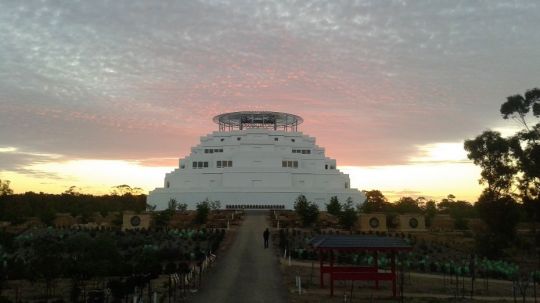
The Great Stupa of Universal Compassion, Bendigo, Victoria, Australia, October 2014. Photo by Tom Kennedy.
Find FPMT Retreat Prayer Book and The Method to Transform a Suffering Life into Happiness (Including Enlightenment) with Additional Practices in the Foundation Store:
shop.fpmt.org/
Watch Rinpoche teach from Bendigo, Australia, during the retreat at the Great Stupa of Universal Compassion, March 30-May 12. For details on the livestream:
https://fpmt.org/media/streaming/lama-zopa-rinpoche-live/
Through comprehensive study programs, practice materials, training seminars, and scholarships, FPMT Education nourishes the development of compassion, wisdom, kindness, and true happiness in individuals of all ages.
- Tagged: australia retreat 2018, fpmt retreat prayer book, the method to transform a suffering life into happiness
15
Cultivating Mindfulness of Bodhichitta in Daily Activities
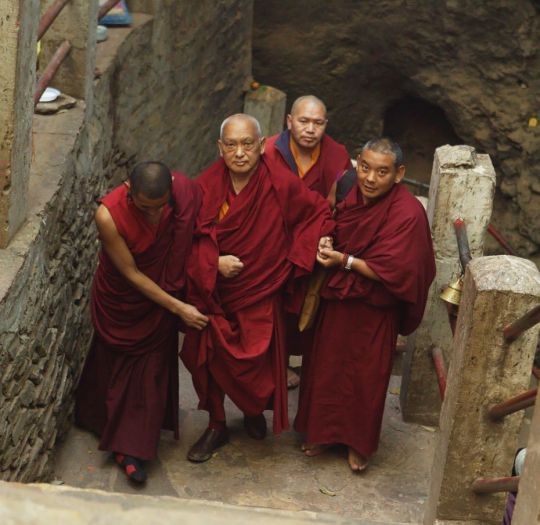
Lama Zopa Rinpoche ascending the stairs of the Maratika Caves, Nepal, February 2016. Photo by Ven. Lobsang Sherab.
In Cultivating Mindfulness of Bodhichitta in Daily Activities, Lama Zopa Rinpoche offers students prayers, visualizations, and advice to help transform daily activities—such as standing up, using the toilet, brushing one’s teeth, dressing, or ascending a staircase—into causes for enlightenment.
For example, Rinpoche teaches in the text: “When you go up a flight of stairs or up a hill (including on a roller coaster!), think: I am bringing all sentient beings to enlightenment.”
“Anyone who is seeking the state of omniscience needs to attend to the many methods for collecting merits and purifying delusions,” Rinpoche reminds students. “The Omniscient One, who was very skillful and had great compassion for us sentient beings, explained that even the activities that we normally do—such as eating, sleeping, sitting, walking, and doing our jobs—can become ways to collect unfathomable virtue and skies of merit. With mindfulness of bodhichitta, they can become not only beneficial to oneself, but beneficial to all sentient beings. The Buddha explained this to us who do not have a bodhichitta realization. This is how everything we do can be dedicated to become a cause of happiness for all sentient beings. This is something that we can practice immediately.”
Students can go deeper in to the topic of transforming daily activities into Dharma practice by studying “Bodhichitta Mindfulness,” a module within the Living in the Path course “Taking the Essence,” on the FPMT Online Learning Center.
“Bodhichitta Mindfulness” includes video teachings from Lama Zopa Rinpoche as well as an introduction to the topic by Ven. Sarah Thresher, additional readings, access to a discussion forum, and other helpful resources.
Find Cultivating Mindfulness of Bodhichitta in Daily Activities on the Foundation Store:
https://shop.fpmt.org/Cultivating-Mindfulness-of-Bodhichitta-in-Daily-Activities-PDF_p_2695.html
Living in the Path is an FPMT education program available through the FPMT Online Learning Center:
https://onlinelearning.fpmt.org/course/index.php?categoryid=5
Through comprehensive study programs, practice materials, training seminars, and scholarships, FPMT Education nourishes the development of compassion, wisdom, kindness, and true happiness in individuals of all ages.
8
Lama Zopa Rinpoche has said very strongly on many occasions that The Method to Transform a Suffering Life into Happiness (Including Enlightenment) with Additional Practices is a practice that he would like all his students to do every day. In this updated edition, the sections “Blessing the Speech” and “Daily Mantras” have been revised based on Rinpoche’s commentaries and the original Tibetan texts from which they are drawn. A new section—“Mantras for Specific Occasions”—includes mantras for increasing the power of sutra recitations and for blessing the feet and the wheels of a car. All the mantras in this edition have been written using a modified version of the International Alphabet of Sanskrit Transliteration (IAST) system that accords with the way Rinpoche would like these specific mantras pronounced. This updated practice is now available through the Foundation Store (hard copies forthcoming).
In addition, the many oral commentaries that Rinpoche has given on this practice have now been compiled and edited into a second booklet—The Method to Transform a Suffering Life into Happiness (Including Enlightenment) with Additional Practices: A Commentary—to help students do these practices in the most meaningful way possible. In the commentary on The Method to Transform a Suffering Life into Happiness (Including Enlightenment), Rinpoche explains how and why it is important to transform our life into Dharma by generating a bodhichitta motivation. In the commentaries to “Blessing the Speech,” “Daily Mantras,” and “Mantras for Specific Occasions,” Rinpoche explains the benefits of doing these practices and how to do them. We hope the commentaries will help inspire all of Rinpoche’s students to take up these practices in their daily lives! The commentary is now available through the Foundation Store.
Through comprehensive study programs, practice materials, training seminars, and scholarships, FPMT Education nourishes the development of compassion, wisdom, kindness, and true happiness in individuals of all ages.
1
Lama Zopa Rinpoche on Oral Transmissions
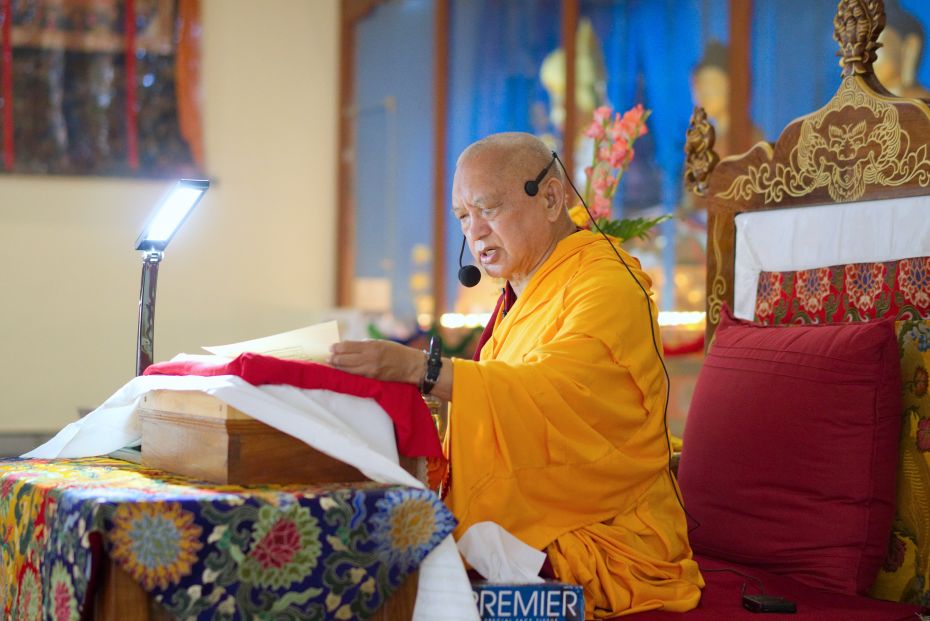
Lama Zopa Rinpoche offering Most Secret Hayagriva oral transmissions, Drati Khangtsen, Sera Je Monastery, Bylakuppe, India, November 2017. Photo by Ven. Lobsang Sherab.
On various occasions, Lama Zopa Rinpoche has taught that receiving the oral transmission (lung) of prayers, practices, and texts is very beneficial. In addition to multiplying the benefits of one’s own recitations of the text by one hundred, the oral transmission creates positive imprints on one’s mind that lead to enlightenment.
“Kyabje Kirti Tsenshab Rinpoche, [one of my teachers,] once gave the oral transmission of the Vajra Cutter Sutra at Land of Medicine Buddha in the United States,” Lama Zopa Rinpoche shared at the 100 Million Mani Retreat at Istituto Lama Tzong Khapa in Pomaia, Italy, in October 2017. “At that time, Rinpoche said that if you have received the lung of the Vajra Cutter Sutra and then you recite it, you get the benefit of having recited it one hundred times.”
“The words leave a positive imprint on the mind and that brings you to enlightenment,” Rinpoche continued. “That brings realizations; that brings you to enlightenment. The lung doesn’t take much time, but the positive imprint left on the mind brings you to enlightenment. Then, you can do perfect work for sentient beings and are able to bring them to enlightenment. You have to know that. That is the basic thing; that is the main thing.”
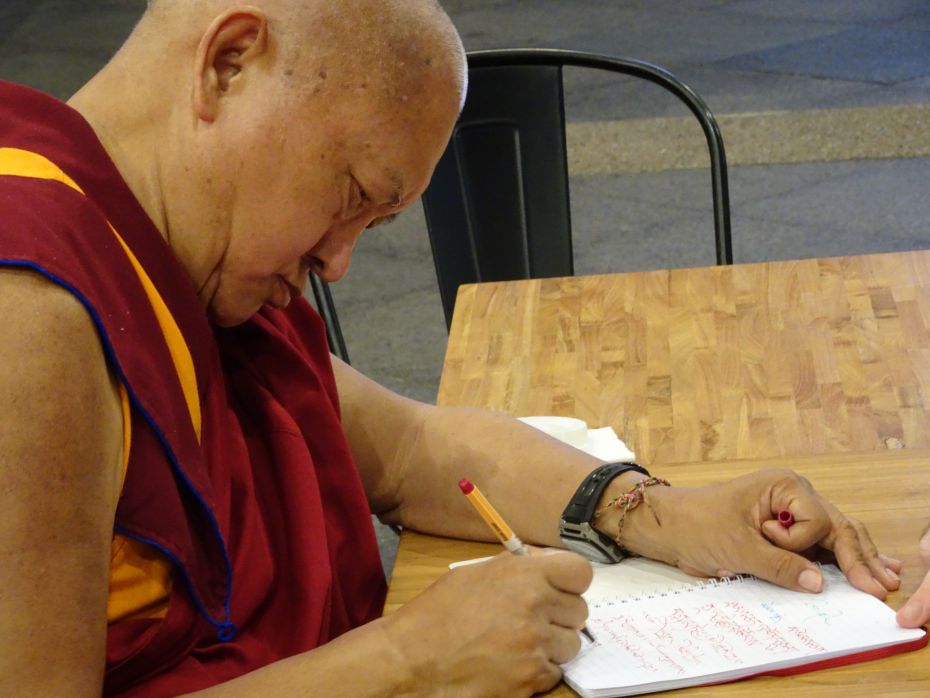
Lama Zopa Rinpoche writing a daily motivation in a monk’s diary, Kuala Lumpur, Malaysia, April 2016. Photo by Ven. Roger Kunsang.
Rinpoche also said that by keeping track of the oral transmissions one has received, one will know in the future if one is able to help support the continuity of the tradition by passing on the lung to someone else, should that be necessary.
“If you get any lung, long or short, write it down,” Rinpoche advised during the 2017 Light of the Path retreat in North Carolina in the United States. “It is very important to write it down so in the future you know which lungs you have received. In the future, some teachings may become very rare and other people will need that lung. At that time, you may have the karma to give the lung to other people, but if you didn’t receive the lineage, you can’t give them the lung because you have to have received the blessings—Buddha’s teachings from the Buddha. So write it down! It is very important for Sangha and lay people to write it down—every teaching, every lung you have received. Otherwise, you won’t know whether you have received it or not and so you won’t be able to help.”
Although most oral transmissions within FPMT must occur in person, you can receive the oral transmission of the Sutra of Golden Light online. Lama Zopa Rinpoche urges us to recite the Sutra of Golden Light every day. The benefits from reciting, listening to, or even hearing the name of the sutra are immeasurable, from eliminating conflict, terrorism, torture, and famine to achieving full enlightenment.
Through comprehensive study programs, practice materials, and training seminars, FPMT Education nourishes the development of compassion, wisdom, kindness, and true happiness in individuals of all ages.
22
Updated! A Daily Meditation on Shakyamuni Buddha
Lama Zopa Rinpoche reorganized many of the prayers based on his current way of doing them and, in particular, added an extensive explanation of the visualizations to be done while taking refuge. Drawn from Phabongkha Rinpoche’s Liberation in the Palm of Your Hand, for each of the objects of refuge—Guru, Buddha, Dharma, and Sangha—there are visualizations for purifying negative karma, increasing qualities, and coming under the guidance of that object of refuge.
Subtitled “How to Meditate on the Graduated Path to Enlightenment,” the practices contained in this booklet prepare the mind for lamrim meditation by purifying negative karma and collecting extensive merit—the two main causes for attaining realizations.
This practice can also be used as a basis for engaging in the preliminary practices of accumulating 100,000 prostrations, mandala offerings, and so forth.
Through comprehensive study programs, practice materials, training seminars, and scholarships, FPMT Education nourishes the development of compassion, wisdom, kindness, and true happiness in individuals of all ages.
8
New Advice for Prostrations from Lama Zopa Rinpoche
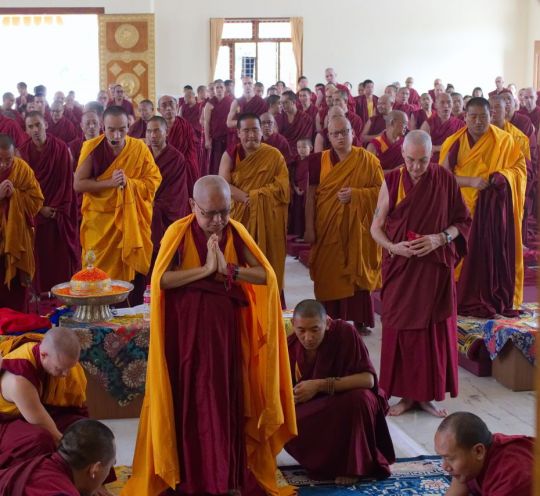
Lama Zopa Rinpoche doing prostrations before giving Hayagriva oral transmissions, Drati Khangsten, Sera Je Monastery, Bylakuppe, India, November 2017. Photo by Ven. Lobsang Sherab.
FPMT Education Services has recently published a short text with updated advice from Lama Zopa Rinpoche on how to do the practice of prostrations. In Advice for Prostrations from Lama Zopa Rinpoche, you can find holy names and mantras to recite before prostrations; advice for the practice of making prostrations to the Thirty-Five Buddhas; a meditation to use while making prostrations to the Thirty-Five Buddhas; the meaning behind “touching the four places” while prostrating, and more!
Advice for Prostrations from Lama Zopa Rinpoche comes from Lama Zopa Rinpoche’s teachings at Root Institute in Bodhgaya, India, January 2017. There, Rinpoche provided some new instructions regarding prostrations, including some changes to the preliminary holy name mantras, and also dictated a new meditation.
Rinpoche asked that these instructions be integrated into the FPMT booklets on the practice of prostrations. They will be included in forthcoming updated versions of the booklets The Practice of Prostrations to the Thirty-Five Confession Buddhas and The Preliminary Practice of Prostrations to the Thirty-Five Confession Buddhas, both available through the Foundation Store.
During a retreat in Bendigo, Australia, 2014, Lama Zopa Rinpoche made extensive changes to many practices including Prostrations to the Thirty-Five Confession Buddhas. Rinpoche advised that preliminary prayers be done before doing the practice of prostrations and that at the end of the practice the “Mantra of Pure Morality” and “Prayer to Keep Pure Morality” be recited. These changes can be found in the FPMT Retreat Prayer Book, 2016 edition.
Through comprehensive study programs, practice materials, training seminars, and scholarships, FPMT Education nourishes the development of compassion, wisdom, kindness, and true happiness in individuals of all ages.
- Tagged: lama zopa rinpoche, prostrations
- Home
- News/Media
- Study & Practice
- About FPMT Education Services
- Latest News
- Programs
- New to Buddhism?
- Buddhist Mind Science: Activating Your Potential
- Heart Advice for Death and Dying
- Discovering Buddhism
- Living in the Path
- Exploring Buddhism
- FPMT Basic Program
- FPMT Masters Program
- FPMT In-Depth Meditation Training
- Maitripa College
- Lotsawa Rinchen Zangpo Translator Program
- Universal Education for Compassion & Wisdom
- Online Learning Center
- Prayers & Practice Materials
- Overview of Prayers & Practices
- Full Catalogue of Prayers & Practice Materials
- Explore Popular Topics
- Benefiting Animals
- Chenrezig Resources
- Death & Dying Resources
- Lama Chopa (Guru Puja)
- Lama Zopa Rinpoche: Compendium of Precious Instructions
- Lama Zopa Rinpoche: Life Practice Advice
- Lama Zopa Rinpoche Practice Series
- Lamrim Resources
- Mantras
- Prayer Book Updates
- Purification Practices
- Sutras
- Thought Transformation (Lojong)
- Audio Materials
- Dharma Dates – Tibetan Calendar
- Translation Services
- Publishing Services
- Teachings and Advice
- Find Teachings and Advice
- Lama Zopa Rinpoche Advice Page
- Lama Zopa Rinpoche: Compendium of Precious Instructions
- Lama Zopa Rinpoche Video Teachings
- ༧སྐྱབས་རྗེ་བཟོད་པ་རིན་པོ་ཆེ་མཆོག་ནས་སྩལ་བའི་བཀའ་སློབ་བརྙན་འཕྲིན།
- Podcasts
- Lama Yeshe Wisdom Archive
- Buddhism FAQ
- Dharma for Young People
- Resources on Holy Objects
- Ways to Offer Support
- Centers
- Affiliates Area
- Teachers
- Projects
- Charitable Projects
- Make a Donation
- Applying for Grants
- News about Projects
- Other Projects within FPMT
- Support International Office
- Projects Photo Galleries
- Give Where Most Needed
- FPMT
- Shop
Translate*
*powered by Google TranslateTranslation of pages on fpmt.org is performed by Google Translate, a third party service which FPMT has no control over. The service provides automated computer translations that are only an approximation of the websites' original content. The translations should not be considered exact and only used as a rough guide.There is no samsaric pleasure that is new, so let go of the clinging that creates samsara.







